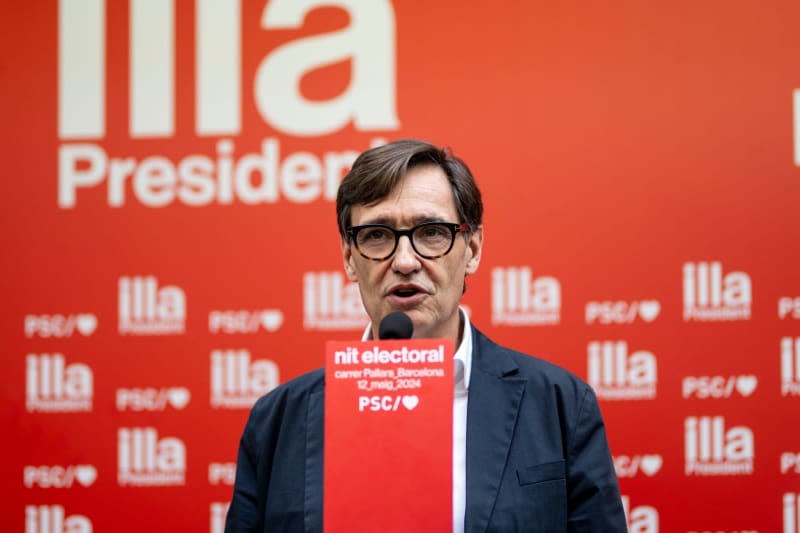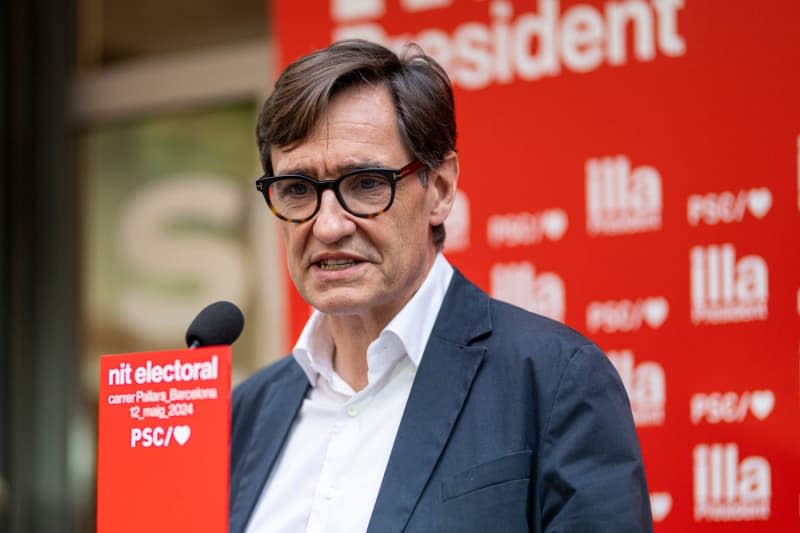Historic separatist defeat in Catalonia's parliamentary elections

- Oops!Something went wrong.Please try again later.
Separatists suffered a historic defeat in Sunday's parliamentary elections in the Spanish region of Catalonia.
For the first time since 1980, the pro-independence parties in the Spanish region combined missed out on an absolute majority of seats in the 135-seat regional parliament in Barcelona.
The Socialists led by top candidate Salvador Illa won the election, though with 42 seats they are a long way from an absolute majority, according to provisional official results.
However, Illa was in a position to be elected head of government with the support of other left-wing parties - and thus prevent a new election, as there appears to be no alternative to a left-wing government.
Spain Prime Minister Pedro Sánchez hailed the victory of the regional offshoot of his national Spanish Socialist Workers' Party (PSOE), the Socialist Party of Catalonia (PSC), in the elections.
Sánchez congratulated Illa "for this historic result achieved in Catalonia," in a message posted on social media platform X. "We socialists are once again the top force."
"Starting today, a new stage begins in Catalonia to improve the lives of citizens, expand rights and strengthen coexistence," Sánchez continued.
According to the provisional results, the conservative-liberal Junts party of separatist leader Carles Puigdemont, who lives in exile, came second with 35 seats.
However, the 61-year-old has no real chance of gathering enough support to form a government. The Republican Left of Catalonia (ERC) party, led by former regional president Pere Aragonès, dropped from 33 seats to just 20.
Combined, the four separatist parties only managed 61 seats, a loss of 13.
Spain's largest opposition party, the conservative People's Party (PP), which traditionally has a difficult time in Catalonia, improved significantly by 12 seats to 15, while the right-wing populist Vox maintained its 11 seats.
The left-wing alternative alliance Commons Unite (Comuns-Sumar), which governs together with the Socialists in Madrid, won six seats, a loss of two, while the left-wing separatist Popular Unity Candidacy (CUP) dropped to four seats from nine and the new, far-right separatist Catalan Alliance (Aliança Catalana) won two seats.
Analysts were unanimous in their assessment of the election result as a major triumph for Sánchez's left-wing central government in Madrid.
With his policy of reconciliation and his concessions, Sánchez largely defused the conflict in Catalonia and took the wind out of the sails of the separatists, who traditionally regard Madrid as "enemy number one," according to analysts on the RTVE television channel late on Sunday evening.
For Sánchez, the support of the separatist parties in the national parliament in Madrid is vital for survival. This is probably one of the reasons why he has promised an amnesty for the organizers of Catalonia's 2017 secession attempt, in addition to other measures to appease them.
The amnesty, which has been sharply criticized by the conservative opposition, has not yet overcome all parliamentary hurdles.
However, it could come into force as early as June - and would also allow Puigdemont, who is still in exile and wanted by the Spanish judiciary on an arrest warrant in connection secession attempt under his leadership, to return to Spain.
Critics from the conservative camp accuse Sánchez of political corruption because he used the amnesty to buy the approval of separatist MPs for his re-election last autumn.
They also claim that he is jeopardizing Spain's territorial unity by making his minority government dependent on separatists, who could force him to agree to an independence referendum.
Catalonia was plunged into chaos in 2017 by an independence referendum and a subsequent decision to secede from Spain declared illegal by Madrid. Puigdemont was able to flee abroad with other members of the government.
Several of those who remained in the country were sentenced to prison terms of up to 13 years, but have since been pardoned.
Catalonia is still living through the consequences of the chaotic attempt at independence - including political instability and a flight of companies and capital.


